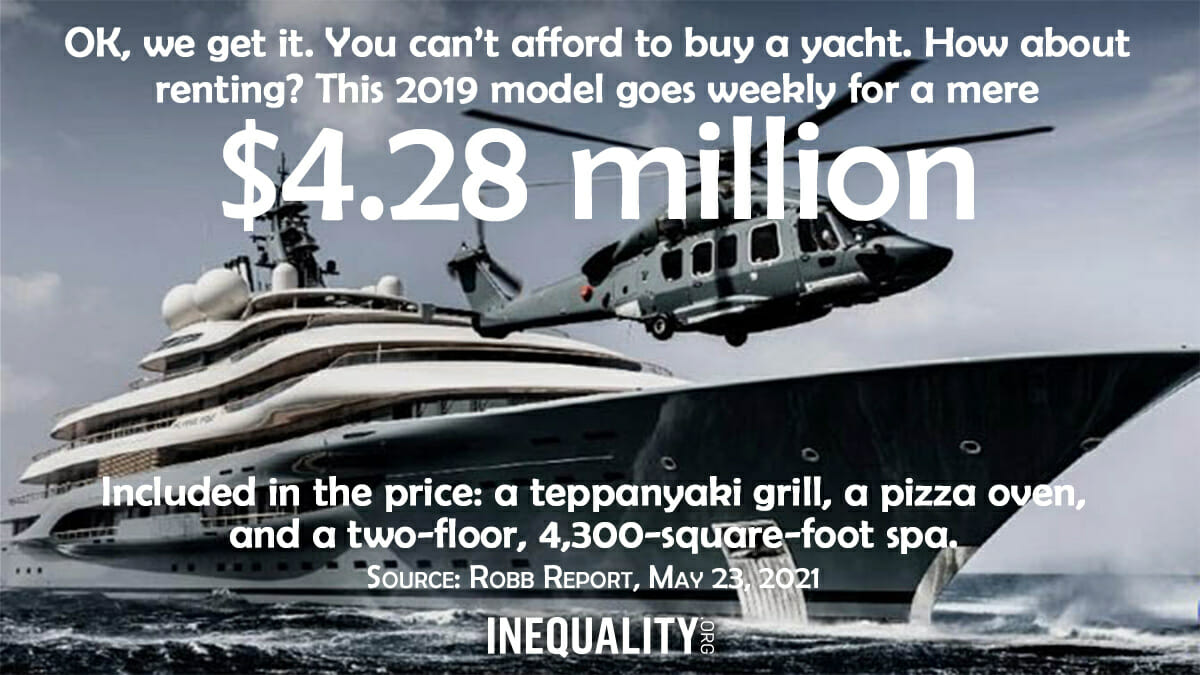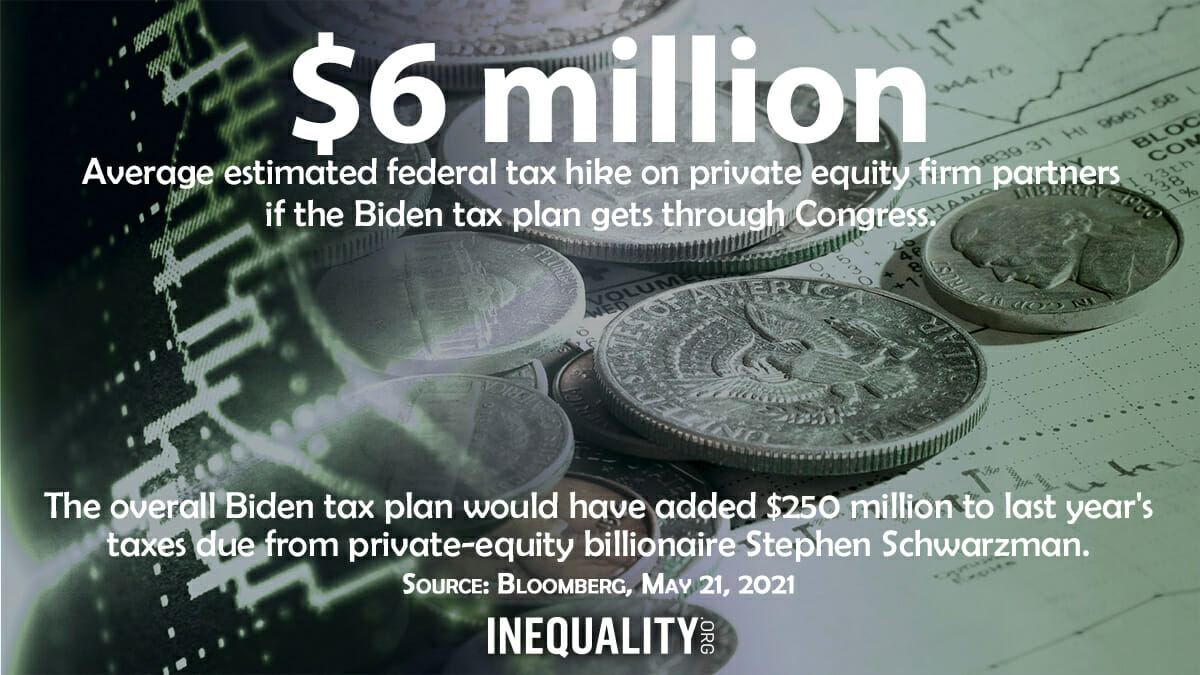| THIS WEEK |
This Memorial Day weekend has offered up some dramatic contrasts to Memorial Day 2020. Normalcy is nearing. Over half the American people have now received at least one dose of the Covid-19 vaccine
But so many of the same issues we faced last May 2020 still remain with us today: low wages, massive concentrations of wealth, a shocking lack of access to childcare and other vital basic social programs. The pandemic aggravates all these problems as the Covid virus marches across the globe.
The Biden administration — with its first federal budget proposal — has an opportunity to put its money where its mouth is and begin to not just address, but remedy, these problems. And we, as people dedicated to building a more equitable world for all, have an opportunity to hold those in power to account.
Chuck Collins and Rebekah Entralgo,
for the Institute for Policy Studies Inequality.org team
|
|
| |
|
| INEQUALITY BY THE NUMBERS |
 |
|
|
|
| |
|
| FACES ON THE FRONTLINES |
 |
| Youth Climate Activists Spotlight Inequality |
| With much of the world beginning to recover from the pandemic, over 100 youth-led organizations have just gathered in person and online for an intersectional dialogue on one of the most pressing issues facing us all. At Power Shift 2021 — a national youth climate justice conference aimed at building collective youth power to address climate disaster, racial justice, and economic transformation — activists made it loud and clear that the youth movement won’t settle for any climate solutions not grounded in addressing inequality. Kayla Soren, a Next Leader at the Institute for Policy Studies and a Power Shift Network organizer, has more. |
|
| |
|
| WORDS OF WISDOM |
 |
|
|
|
| |
|
PETULANT PLUTOCRAT
OF THE WEEK |
 |
| No Absolution for the CEO Brute Nobody Believes |
| Veteran CBS CEO Les Moonves had it all. During his TV network reign, no media exec made more than Moonves. From 2006 to 2017, Equilar estimates, he pocketed at least $1.02 billion in compensation. But that gravy train went flying off the tracks in 2018 after a dozen different women charged — in two New Yorker exposés — that Moonves had been a decades-long sexual predator. Moonves denied all the charges against him. During his tenure, he insisted, CBS “promoted a culture of respect and opportunity for all employees.” After the first New Yorker story, Moonves and CBS seemed on the verge of closing a $120-million severance deal to ease him out the door. But then the second story hit. Moonves quickly “resigned,” and CBS, facing widespread public pressure, put his $120-million severance on ice pending further review. That review — and the legal wrangling around it — ended earlier this month. Moonves won’t be seeing any severance. Meanwhile, CEO Magazine reported last week, U.S. corporations have now spent $3 billion “scrambling to buy insurance to cover themselves for sexual harassment claims.” |
|
| |
|
| BOLD SOLUTIONS |
 |
| Regulating Unregulated Pools of Wealth |
| What do “family offices” do and why should you care what they’re doing? In his new book, The Wealth Hoarders: How Billionaires Pay Millions to Hide Trillions, Inequality.org’s Chuck Collins explains how highly secretive “family offices” have emerged as a central key to the global “wealth defense industry.” These offices occupy an unregulated corner of the financial marketplace and manage an estimated $6 trillion in assets. How can we rein them in? We could require all family offices to register with the federal Securities and Exchange Commission and publicly report option and stock positions on a quarterly basis. Chuck has more in an informative new video and policy brief. And if this video leaves you outraged, you can take action by registering your comments with the SEC (file # S7-02-21) . |
|
| |
|
| GREED AT A GLANCE |
 |
|
|
|
| |
|
| TOO MUCH |
 |
| To Grow Our Economic Pie, Cut More Equal Slices! |
| Our nation’s progressive economists have, over recent decades, expended considerable brainpower tracing how furiously wealth is concentrating — and exposing the latest fantasies of the trickle-down set. But they need to be exploring just as diligently, economic analyst Steve Roth suggests, “the economic effects of wealth concentration,” the real-life impact of trickle-up. What actually happens, in other words, when wealth keeps concentrating among “fewer people, families, and dynasties, in larger and larger fortunes”? Roth has a fascinating new paper out that does this sort of exploring. Inequality.org co-editor Sam Pizzigati has the details. |
|
|
|
| |
|
| MUST READS |
This week on Inequality.org
Sam Pizzigati, To Grow Our Economic Pie, Cut More Equal Slices!. Redistributing wealth downward, new calculations suggest, can make societies richer.
Robert Alvarez, New Research Vindicates Scientist Attacked by Pork Industry Over Environmental Racism Charges. Corporate industrial livestock operations pose serious health threats to nearby residents, often low-income people of color.
Elsewhere on the Web
Sarah Anderson, How CEOs Pumped Up Their Pandemic Paychecks, Newsweek. Corporate America has a “pay for nonperformance” system for its almost entirely white and male army of chief executive officers.
Chuck Collins, How billionaires’ secretive speculation threatens the next financial meltdown, MarketWatch. The implosion of Archegos Capital ought to be an early warning sign about the next generation of unaccountable capital and exotic financial instruments hidden inside “family offices.”
Marcus Baram, American Workers Earn About Half What They Deserve, Capital & Main. The economic decline that afflicts so many Americans reflects deliberate policy choices that privilege the rich over the rest of us.
Linsey McGoey, Why billionaires like Bill Gates can't fix problems they create, Business Times. Asking philanthropists to fix inequality amounts to asking arsonists to hose down your house after they just set it on fire.
Mike Mechanic, You Just Paid Your Taxes. Here’s How the Superrich Avoid Them, Mother Jones. And how Joe Biden’s proposals might address some of that.
Joel Anderson, How Many Minutes Does It Take a CEO To Earn Your Annual Salary? Yahoo Finance. Sundar Pichai of Google parent Alphabet at one point was clearing $534 per minute.
Pam Martens and Russ Martens, Three Wall Street Mega Banks Have Admitted to a Combined Eight Felony Counts, Wall Street on Parade. Until 2014, no major Wall Street bank with federally insured deposits had ever been charged with a felony. That has all changed, but bank CEOs continue to suffer no consequences.
Jeong Park and Hannah Wiley, Is Newsom trying to be Robin Hood? What his budget means for wealth inequality in California, Sacramento Bee. Amazing what seriously taxing the rich can do. But California, progressive lawmakers say, could do still more.
Brendan Ogle, It’s time to stop gaslighting the public over income inequality, The Journal. In Ireland, a tax system that actively encourages tax avoidance has left deprivation entrenched, the housing crisis all-encompassing, and public services decayed.
Grant Suneson, The Countries with the Widest Gaps Between Rich and Poor, 24/7 Wall St. Among the world’s largest nations, Brazil has become the most stunningly unequal. |
|
| |
|
| A FINAL FIGURE |
 |
|
|
|
| |
|
| BE THE 1% (NO, NOT THAT 1%) |
 |
Our goal for 2021: that 1% of our Inequality.org subscribers become monthly sustainers and help grow our newsletter and research efforts. Be the 1%, for as little as $3 a month! |
|
|
|
| |
|
|